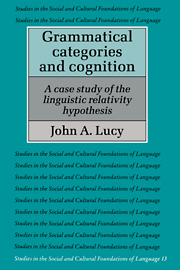1 - Background of the comparative research in Yucatan, Mexico
Published online by Cambridge University Press: 19 January 2010
Summary
Effective comparative investigation of the linguistic relativity hypothesis requires direct linguistic, ethnographic, and psychological research in two or more cultures. The present study is based on such research conducted among middle-class Americans and among the Mayan people of Yucatan, Mexico. This chapter provides general background on salient elements of the Yucatecan cultural context since these are likely to be unfamiliar to most readers. Some general comments on the course of the foreign fieldwork and sequence of task administration are also included.
Background on the Yucatec Maya culture
This section provides schematic information about the Yucatecan culture and community where the comparative research was conducted. The account places the rural Yucatecan village culture within the larger array of world cultures and within the Mexican national scene by characterizing its history and social organization in very global terms. Specific details are added where necessary to indicate how the particular village differs from the general Yucatecan pattern, to facilitate interpreting the stimulus materials described in chapter 3, and to highlight salient contrasts with American culture.
History and social geography
The Mayan people of concern in this study are resident in a small rural village in the state of Yucatan in southeastern Mexico. Historically, they are related to the ancient Mayan peoples whose civilization was predominant throughout the region during the pre-Columbian era. This ancient Mayan civilization reached its zenith in a “Classic” period running from approximately AD 300 through AD 900, during which time achievements in the arts and sciences reached a level unexcelled by any other native culture of the New World.
- Type
- Chapter
- Information
- Grammatical Categories and CognitionA Case Study of the Linguistic Relativity Hypothesis, pp. 7 - 22Publisher: Cambridge University PressPrint publication year: 1992



